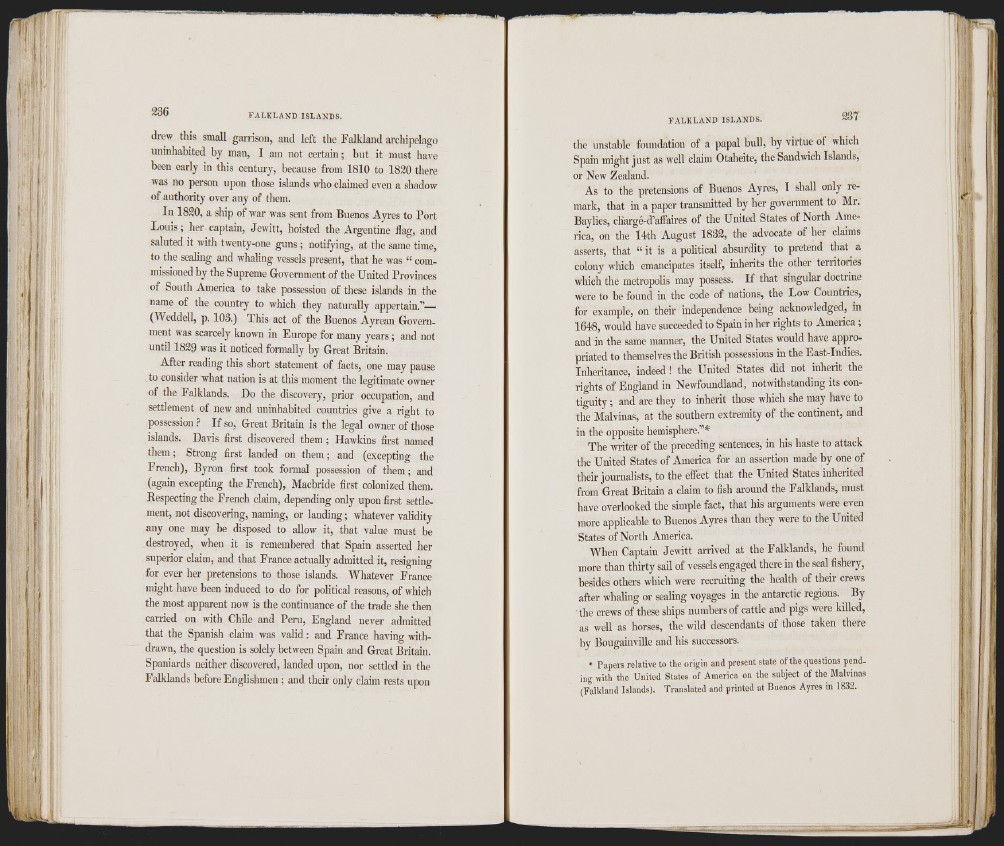
i I'
i
236
drew this small garrison, and left the Falkland archipelago
uninhabited by man, I am not certain; but it must have
been early in this century, because from 1810 to 1820 there
was no person upon those islands who claimed even a shadow
of authority over any of them.
In 1820, a ship of war was sent from Buenos Ayres to Port
Louis ; her captain, Jewitt, hoisted the Argentine flag, and
saluted it with twenty-one guns ; notifying, at the same time,
to the sealing and whaling vessels present, that he was “ commissioned
by the Supreme Government of the United Provinces
of South America to take possession of these islands in the
name of the country to which they naturally appertain.”—
(Weddell, p. 103.) This act of the Buenos Ayrean Government
was scarcely known in Europe for many years; and not
until 1829 was it noticed formally by Great Britain.
After reading this short statement of facts, one may pause
to consider what nation is at this moment the legitimate owner
of the Falklands. Do the discovery, prior occupation, and
settlement of new and uninhabited countries give a right to
possession ? I f so. Great Britain is the legal owner of those
islands. Davis first discovered them ; Hawkins first named
them; Strong first landed on them; and (excepting the
French), Byron first took formal possession of them; and
(again excepting the French), Macbride first colonized them.
Respecting the French claim, depending only upon first settlement,
not discovering, naming, or landing; whatever validity
any one may be disposed to allow it, that value must be
destroyed, when it is remembered that Spain asserted her
superior claim, and that France actually admitted it, resigning
for ever her pretensions to those islands. Whatever France
might have been induced to do for political reasons, of which
the most apparent now is the continuance of the trade she then
carried on with Chile and Peru, England never admitted
that the Spanish claim was valid : and France having withdrawn,
the question is solely between Spain and Great Britain.
Spaniards neither discovered, landed upon, nor settled in the
Falklands before Englishmen ; and their only claim rests upon
the unstable foundation of a papal bull, by virtue of which
Spain might just as well claim Otaheite, the Sandwich Islands,
or New Zealand.
As to the pretensions of Buenos Ayres, I shall only remark,
that in a paper transmitted by her government to Mr.
Baylies, cliarge-d’affaires of the United States of North America,
on the 14th August 1832, the advocate of her claims
asserts, that “ it is a political absurdity to pretend that a
colony which emancipates itself, inherits the other territories
which the metropolis may possess. I f that singular doctrine
were to be found in the code of nations, the Low Countries,
for example, on their independence being acknowledged, in
1648, would have succeeded to Spain in her rights to America ;
and in the same manner, the United States would have appropriated
to themselves the British possessions in the East-Indies.
Inheritance, indeed ! the United States did not inherit the
rights of England in Newfoundland, notwithstanding its contiguity
; and are they to inherit those which she may have to
the Malvinas, at the southern extremity of the continent, and
in the opposite hemisphere.”*
The writer of the preceding sentences, in his haste to attack
the United States of Ameilca for an assertion made by one of
their journalists, to the effect that the United States inherited
from Great Britain a claim to fish around the Falklands, must
have overlooked the simple fact, that his arguments were even
more applicable to Buenos Ayres than they were to the United
States of North America.
When Captain Jewitt arrived at the Falklands, he found
more than thirty sail of vessels engaged there in the seal fishery,
besides others which were recruiting the health of their crews
after whaling or sealing voyages in the antarctic regions. ^ By
the crews of these ships numbers of cattle and pigs were killed,
as well as horses, the wild descendants of those taken there
by Bougainville and his successors.
* Papers relative to the origin and present state of the questions pending
with the United States of America on the subject of the Malvinas
(Falkland Islands). Translated and printed at Buenos Ayres in 1832.
illl
i